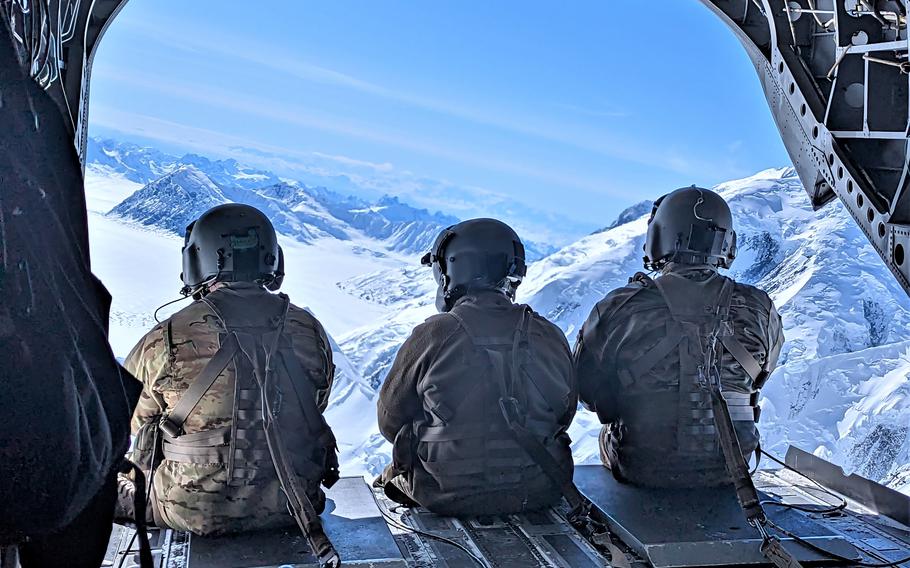
Soldiers from Bravo Company, 1st Battalion, 52nd Aviation Regiment enjoy the view on the flight back from the National Park Service’s mountaineering base camp on Kahiltna Glacier in Denali National Park and Preserve in Alaska. (Eve Baker/Fort Wainwright Public Affairs Office)
WASHINGTON — Troops who are permanently stationed in Alaska can now fly to their home in the contiguous United States this year and the military will pay for it, according to a change in Pentagon policy.
The National Defense Authorization Act for 2023 specifies troops with a permanent duty station in Alaska are entitled to be reimbursed for a round-trip plane ticket to their “home of record in the U.S.” They are eligible for reimbursement for travel occurring between December 2022 and the end of 2023.
“Section 603 of the FY23 NDAA directs the secretaries of the armed forces to reimburse eligible armed forces members the cost of airfare from the member’s permanent duty station to their home of record … and travel is authorized by an officer above the grade of O-5,” says a memo from the Pentagon’s Per Diem, Travel and Transportation Allowance Committee.
Troops can be reimbursed for the cost of airfare to their home only once during that time, the Army’s 11th Airborne Division — also known as the “Arctic Angels” — said in announcing the policy to its soldiers on social media.
“Good news Arctic Angels — We’re going to fly you home,” the unit said on its Facebook page. “This is retroactive … so, if you’ve already bought your ticket home, you’re eligible for reimbursement.”
The 11th Airborne Division has brigades at Joint Base Elmendorf-Richardson near Anchorage, Alaska’s largest city, and Fort Wainwright in Fairbanks.
The travel reimbursement is part of the military’s effort to improve quality of life for men and women serving in Alaska, which can be a physically and mentally challenging place to live due mainly to factors such as limited daylight and extreme cold during the winter months.
In 2021, the state had a suicide rate of 31 for every 100,000 people, according to the National Center for Health Statistics, which was third highest in the United States after Wyoming and Montana, two other sparsely populated cold weather states. During the same year, suicides among soldiers stationed in Alaska spiked to 17, according to Army data.
“We may never know all the factors for this recent spike or the reasons for each of these tragedies,” Maj. Gen. Brian Eifler, commander of the 11th Airborne Division, wrote in a letter to the unit in the fall after four soldiers died by suicide within three weeks. “These recent losses are a heartbreaking reminder that this battle is not over.”
To stem rising suicide numbers, the Pentagon has invested more in prevention efforts such as mental health counseling, wellness checks and quality-of-life upgrades.
Sgt. Maj. of the Army Michael Grinston, the service’s highest-ranking enlisted soldier, expressed delight with the travel reimbursement.
“Impressive [quality-of-life] initiative,” Grinston said in a tweet, in which he thanked Eifler and his unit for “finding ways to take care of our soldiers.”
There are several U.S. bases in Alaska, but most troops are stationed at the Army’s Fort Wainwright or Joint Base Elmendorf-Richardson. The locations are home to tens of thousands of service members and their families.
Deputy Defense Secretary Kathleen Hicks traveled to Alaska last month specifically to meet with military families and listen to their concerns about quality-of-life issues. She said she returned to Washington with “deeper insights” on matters “that affect our service members in Alaska.”
“Quality-of-life issues like access to quality, affordable child care; healthy, affordable food, and community connections are not only a workforce enabler, but a critical component of the readiness, efficiency and retention of the total force,” Hicks said.
Earlier this year, the Pentagon’s Suicide Prevention and Response Independent Review Committee made more than 100 recommendations to help bring down the number of suicides in the military. A couple of its suggestions were to reform the military’s promotion system to “select the right people for the right positions” and raise the minimum age to buy firearms on military bases to 25.